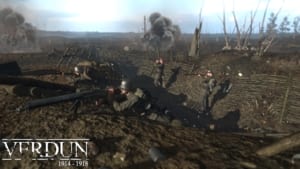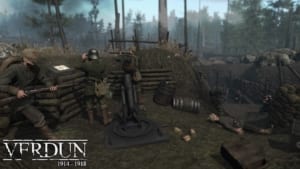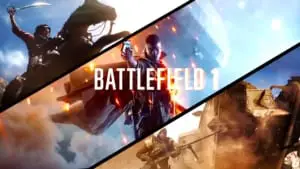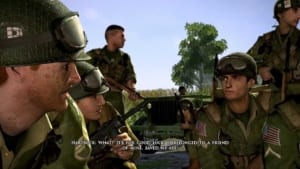I hop onto my laptop, ready to waste some of the time in my day playing video games. I choose Verdun, an indie FPS built on the Unity engine, set in the Western Front of World War 1, in the bombed out fields and deep trenches of France and Belgium.

The game is merciless, difficult, aggravating, frustrating, and long. No surprise there, it is WW1 after all. I begin to think about how, intentional or not, the game perfectly encapsulated that which people most imagine when thinking about WW1. A long drawn out affair for little to no gain, with courageous young men being sent to die for wealthy politicians and diplomats who are hundreds of miles away from the front.
Regardless of the actual accuracy of that sentiment, it is what people continue to think of when they hear “World War 1.” The utter futility of the conflict. Torturous, unending woe for reasons few can accurately explain. You will find a great deal of WW2 movies that are bombastic, loud, glorifying, and even fun. WW1 movies almost ways center their action on the utter misery the soldiers felt, living and dying, usually in the muddy trenches of France. It’s one of the few times that violence in war movies is not glorified. Seldom will you find depictions of heroic glory and valor… unless the action takes place in the air of course.
This is not to say there is glory or valor in any other war. There isn’t. But WW1 is that one war (alongside the Vietnam War) that has, almost since the start, been used to spread the message that war is an unceasing Hell on Earth that future generations must work to avoid. And it’s an important message! One that more war movies and games should try and portray.
But this is why I find it incredibly strange that Verdun awards players with points for killing your fellow man.
In All Quiet on The Western Front, written by WW1 veteran Erich Maria Remarque, there is a scene where the main character brutally murders, for the first time, an enemy French soldier. Wracked with immense grief, he begs the corpse of the man to forgive him for what he has done. In Verdun, however, an action that Remarque found to be abhorrent and tragic is rewarded. You progress in the game solely through the action of murder. Bodies are strewn about and ripped by shell fire, dismembering, exposing brain matter, for the player to gawk at and go “gross, but also cool.”

This isn’t me saying the game is bad, or terrible. This isn’t a review on the game mechanics. I was merely forced to ponder how strangely games tend to approach WW1 itself, and how at odds this approach is with other media portrayals you find. Here was a war that is so firmly cemented in the zeitgeist as a futile and useless waste of life, to the point where for the longest time WW1 games were seldom even made or considered. And when they were made, they were often alternate realities. For a long time, no one believed you could make a game about WW1 “fun.” People would constantly state that it’s impossible to make WW1 fun… as if war itself is somehow fun in real life.
Maybe the question they should be asking themselves is this: even if one can make WW1 “fun,” is making it fun the right thing to do?
Is a “fun WW1 game” something we should even aim for? Isn’t that in and of itself a childish exploitation of senseless slaughter? Is it really worth it? Isn’t it insulting to see ANY war as a ‘fun’ setting? Especially an actual war? What kind of message are we sending by doing our best to whitewash war to such an extent that it can be made palatable and consumable for a wider audience?
Video games are of course, primarily a method of entertainment. I’m not somehow speaking from on high to the lowly plebs, hoisting my own enlightened self above the shallow refuse. I like to play war games just as much as anyone. Also, history is a topic I am very much interested in, so I am delighted to hear of new games based on historical periods being made. I also enjoy them greatly, as evidenced by the many hours I’ve poured into playing Mount & Blade.
But I also think that as an emerging art form, games should also be able to strive to approach war in more interesting and even teachable ways wherever possible, rather than resort to mere spectacle as they’ve done in the past. For example, the recent release of Battlefield 1 stretched history to such a ludicrous degree to justify its content, it looks and feels nothing like WW1 at all. The game studio, EA DICE, looked at WW1 and it’s many popular depictions and realized they couldn’t get away with making it accurate because then it wouldn’t be “fun.” So, they bastardized it until they almost glorified it. Almost.

The game still, bafflingly, tried to accommodate the WW1 zeitgeist as best as it could. It repeats all the points you’ve come to expect from WW1 in media. A useless conflict, utter futility, waste of life, “lions leading donkeys”, etc. However, this did not square well with the gameplay; in fact, it is utterly at odds with it. To incentivize killing in a setting that has become synonymous with senseless slaughter strikes me as kind of ironic. It also causes all kinds of ludonarrative dissonance, a common issue with video games lately.
The very first mission tells you outright that you’re “not expected to survive.” It then puts you into the shoes of several soldiers as all of them, one by one, are killed in action, unceremoniously and suddenly. A lone German soldier can be seen, crouched in the muddy and cratered field, rocking back and forth, in shock. Another one aimlessly and slowly wanders about, dazed and hopeless, resigned to his fate. It is very effective at getting the point across, if the point is to highlight the horrors of war.
And then a few missions later, you strap on a suit of plate armor and climb a mountain while fighting off the Austro-Hungarian army with a handheld 60lb. machine gun.

Something went wrong here, I think. Something got lost in translation.
You needn’t look further for evidence for the ass-backwards (and in this case, incredibly disrespectful) way the developers of Battlefield 1 treat WW1 as a topic than the hashtag #JustWW1Things that the developers attempted to popularize… it was not well recieved. (Content warning, graphic photos within that link.)
So really the question that bothers me is, what directions should war games head towards that ensures they’re portrayed with maturity and respect? It’s not something that HASN’T ever been done before, or can’t ever be done again. Look no further than the Gearbox Brothers in Arms series, where you take on the role of Sgt. Matthew Baker in the famed US 101st Airborne as he and his squad fight through France and Holland during WW2.
The games take a more tactical approach than most shooters, meaning the actual combat is much slower, smarter, methodical, and more meticulous. You have to keep an eye on your team mates. Running and gunning like in Battlefield 1 is not encouraged, as even one shot can kill you. More importantly however, the war is not glorified in any way. It’s neither flashy, nor bombastic. Baker struggles to keep his team together, while trying to keep himself together in the process. The games portray Baker’s fragile sanity breaking apart as he struggles to cope with the stress of losing friends under his command. By the third game, his grief is so great that he is actively hallucinating; he speaks to a vision of a fallen comrade that continuously haunts and taunts him for his failures as a Sargeant, and ominously hints at failures yet to come.

The games also, remarkably, feature civilians and civilian casualties, something almost all games set during the two world wars entirely ignore and erase, in order to accommodate and comfort the player. This sharply contrasts Battlefield 1’s approach, which as stated above, has you strap on a suit of nigh impenetrable steel armor and mow down hundreds of Austro Hungarian soldiers with a machine gun while ascending a mountain. Being respectful or restrained was very clearly the least of their concern; it was all about the spectacle. It’s as if the intent is not to disturb the player TOO much or remind them that these events actually happened, and that millions of people died. Honesty would get in the way of the fun.
In Verdun, you get none of Brothers in Arms‘ rumination on the nature of war, because Verdun is a multiplayer game. It is by design meant to be enjoyed with a team, and so it is not an ideal place to accurately or respectfully portray the horrors of war. Despite this, it still achieves the horrific tone of WW1, which is a source of endless praise for me. Even when the mechanics clash with the presentation.
It’s not that the Brothers in Arms series was perfect, and neither is Verdun, but they were steps in the right direction. They portray war in ways that I think other games should definitely attempt to emulate. Not just for the medium itself, but for young and impressionable people who will potentially grow up on them. A large part of history is perception, after all.

